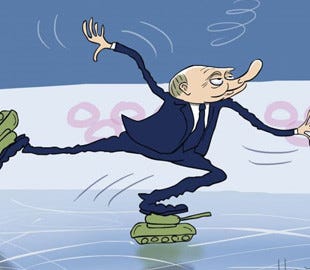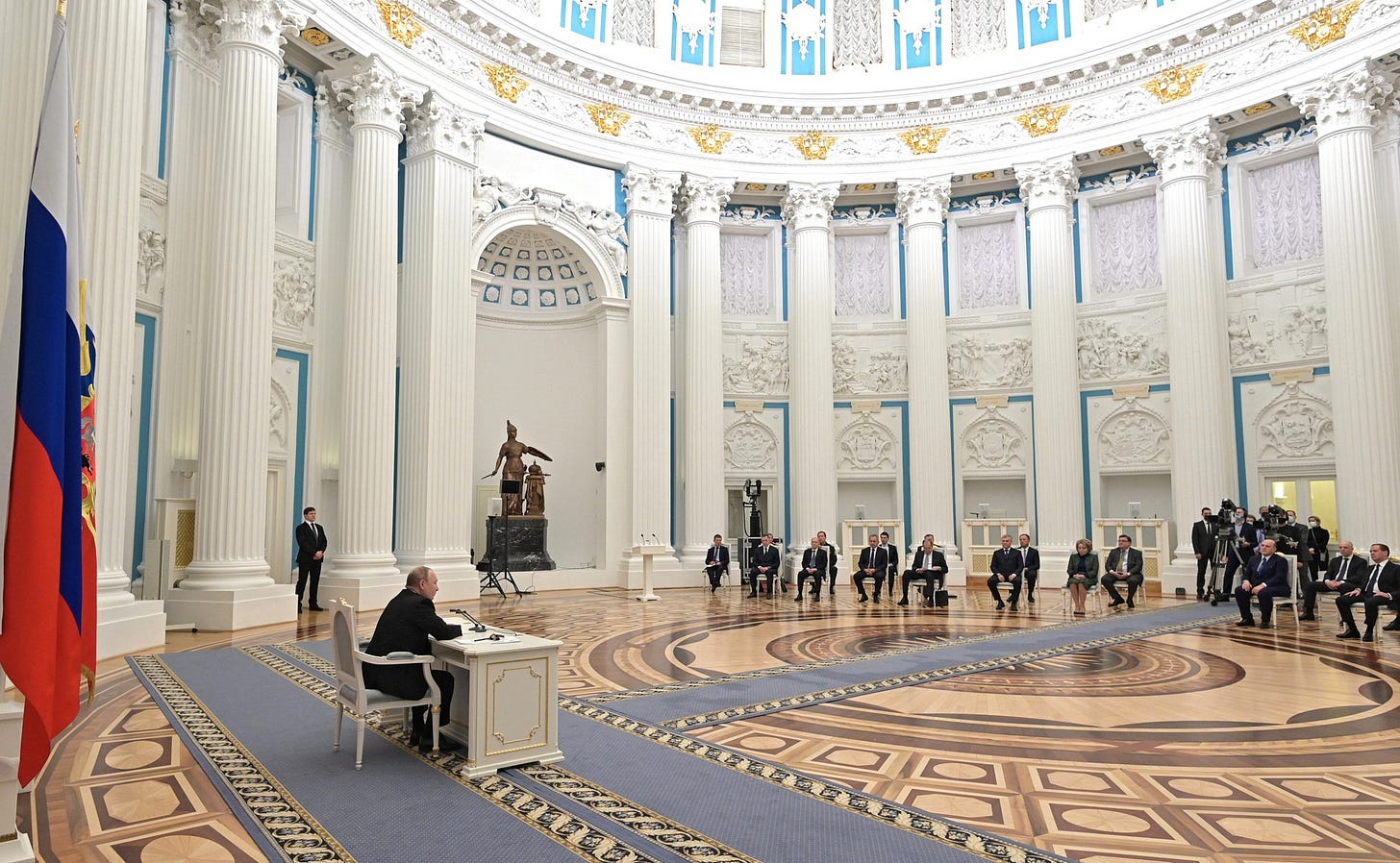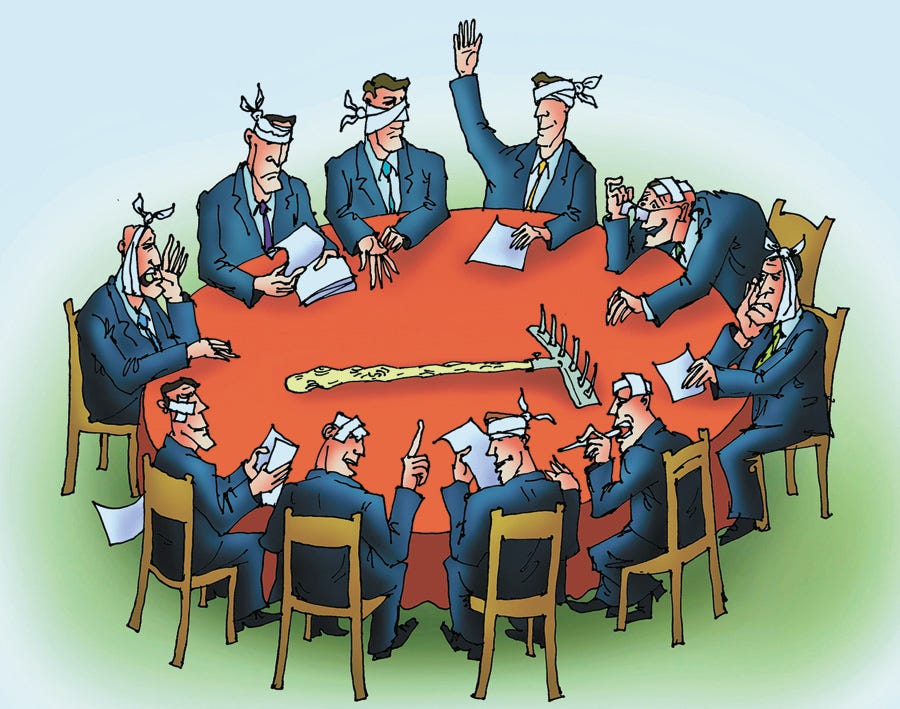The war had almost begun. Walking the line. The secret of brotherly aid. You don’t want oil? Get hydrogen!
February 22, 2022
The war had almost begun. Or?
This excerpt was written before the Russian Security Council meeting (Monday, February 21) and before Russia recognized LNR/DNR independence.
On Friday evening, February 18, the leaders of the self-proclaimed entities in eastern Ukraine (LNR/DNR) released statements about an allegedly ready offensive by Ukrainian Armed Forces troops. They announced the start of the forced evacuation of women, children, and the elderly to Russian territory. Russian presidential press secretary Dmitry Peskov said he knew nothing. An hour and a half after the incident, the same Dmitry Peskov said that the Governor of the Rostov region, Vasily Golubev, who was able to reach the Russian President, told Putin about the refugee problem.
Putin had a telephone conversation with the acting head of EMERCOM, Alexander Chupriyan, and instructed him to fly to the Rostov region urgently to organize on-site work to create conditions for accommodation, provide hot meals, and everything needed, including medical care. The President also instructed the Russian government to urgently provide payment of 10,000 rubles to each refugee arriving in the region from Donbas.
Over the past two days, according to Alexander Chupriyan, Acting Minister for Emergency Situations, about 53,000 people have been transported to the Rostov, Voronezh, and Kursk regions of Russia and placed in boarding houses, tent camps, and gyms. LNR/DNR leaders stated that up to 700,000 people in total could be evacuated.
These events were accompanied by more intensive shelling of Ukrainian territory by the LNR/DNR and a strong information flow about the alleged shelling of the territories of the self-proclaimed republics by the AFU. There were three reports of ammunition explosions on Russian territory—all of them occurred in areas closed to journalists, and there were no casualties. Several blasts of infrastructure facilities (gas pipeline, water treatment plant) were reported in LNR/DNR territories. At the same time, Russia unexpectedly announced an exercise of strategic deterrence forces with launches of ballistic and cruise missiles from various country regions on February 19. Such activities have not been conducted for two years. In addition, President Putin signed a decree related to calling up citizens in reserve for training. He signs such a decree every year, but it usually happens in April.
War?
It seemed like it was. Very similar to what could have happened. The exact population evacuation as in Tskhinvali in 2008, the same provocations as the radio station in Gleiwitz in 1939. But it didn’t happen? Or hasn’t happened yet?
I have already said that everything occurring in the relationship between Russia and Ukraine, Russia and the West, is Vladimir Putin’s game. Of course, he cannot develop plans for military operations or information campaigns on his own—he needs dozens or hundreds of underlings to do this. But there is no doubt that it is up to the Russian President to decide which billets to take out of his portfolio and which of the developed plans to start implementing. Only he knows what goal Russia is pursuing, what risks he is willing to take, and what price to pay.
In my view, what has happened over the past three days fits well with Vladimir Putin’s essential attitude, which he voiced last November: To hold the tension. On the one hand, the Kremlin was able to change the agenda of the Munich Security Conference, where instead of discussing policy toward Russia, current events dominated the discussion. On the other hand, the mass evacuation of LNR/DNR residents was another element in the Kremlin’s chain of exercises and maneuvers. An analysis of the video messages of LNR/DNR leaders showed that they were recorded on February 16, two days before they were broadcast. Still, the word “today” appears in these messages. Judging that the civil defense siren sounded in Donetsk only an hour after the video clips were published, the start time of this part of the exercise was unexpected, even for those who recorded these appeals.
What is the point of this policy to maintain suspense? First, it is a desire to dominate and dictate the agenda. Second, it is a desire to speed up security agreements that the Kremlin has voiced. Constant pressure on the opponent may force the latter to make mistakes or choose less-than-robust answers. Third, the desire to split the unity of the West by moving the U.S. to negotiate with Russia one-on-one without the participation of other countries. Fourth, the desire to force Ukraine to comply with the Minsk agreements would allow Putin to “return” Donbas to Ukraine and demand the lifting of sanctions. Ukraine’s refusal to abide by the Minsk agreements will weaken support for the latter by Western countries.
This weekend for Putin: French President Emmanuel Macron arranged a meeting of the Trilateral Contact Group to peacefully settle the situation in eastern Ukraine (Ukraine+Russia+OSCE/LNR and DNR as participants); President Biden agreed to meet with Vladimir Putin in the coming days.
The result of this weekend for the West was Putin’s implicit promise not to start a war before meeting with President Biden.
Walking the line
President Putin keeps his promise not to start a war against Ukraine. But he continues to escalate tensions and test the West’s willingness to take harsh measures or make concessions and compromises.
A telling public meeting of the Russian Security Council allowed us to look behind the Kremlin wall and hear how Vladimir Putin and his inner circle see the world. Here are some of the more memorable quotations:
Vyacheslav Volodin, Speaker of the State Duma
The number of [residents of Donbas] who applied for citizenship of the Russian Federation is one million two hundred thousand... Therefore, we are talking about protecting, first and foremost, citizens of our country and our compatriots.
Speaker of the Federation Council, Valentina Matvienko
…during 30 years of separate existence as two independent states, what has Russia done wrong to Ukraine? Yes, they wanted to have a NATO flag instead of the flag of the Russian Black Sea Fleet in Sevastopol, but we don't have the moral right to allow that.
Nikolai Patrushev, Secretary of the Security Council
Negotiations should be conducted, but negotiations should be conducted with the United States. Everyone else will do what the United States tells them to do - NATO will do it, the OSCE, the European Union, and so on. [The conflict in Donbas] was not organized by the people of Ukraine. The people of Ukraine are against it... It was organized by the United States
Mikhail Mishustin, Prime Minister
We need to aggravate this situation today, go into it, because this is the only way we can catalyze import substitution processes and meet the national development goals that you, Vladimir Vladimirovich, have set.
Sergey Shoigu, Defense Minister
When they say it is defensive, I find it hard to imagine that the same [anti-tank systems] Javelins are defensive weapons.
Viktor Zolotov, commander of the Russian Guard
We don't border with Ukraine, we don't have a border with Ukraine. This is the border of the Americans because they are the masters of this country, and all these people are their vassals.
Recognition of LNR/DNR independence did little to change the situation. Russia has not crossed that “red line” beyond which begins the “invasion of Ukrainian territory,” as Washington understands. The territory in eastern Ukraine has been outside Kyiv’s control for 7.5 years, and in this respect, the LNR/DNR has long been independent. But the self-proclaimed republics cannot survive a day without Russian military and financial support, so they have not been, and will not be, independent of Russia.
The main change is the death of the Minsk agreements and the Normandy format. From now on, there is no framework for further negotiations on the fate of eastern Ukraine, and it is not certain that such talks will begin while Vladimir Putin is in power. In any case, Germany and France have been excluded from discussing Ukraine’s problems with Russia; if such talks do take place, the Kremlin will conduct them only with Washington.
Sergey Lavrov, Minister of Foreign Affairs
The United States develops a unified position, so Munich confirmed that it is necessary to talk to Washington.
The recognition of the independence of the “republics” is an intermediate episode in Vladimir Putin’s play. In my opinion, we should expect more escalator moves by Putin in the next few days if the West responds as I see it at the time of writing: President Biden issued an executive order prohibiting new investment, trade, and financing by U.S. persons to, from, or in the so-called DNR and LNR in Ukraine. This executive order also gives the power to impose sanctions on any person doing business in these regions of Ukraine.
Obviously, after 2014, few (if any) Western investors were willing to risk their money on the territory of the “republics.” Therefore, the imposed bans will be even less painful than the Crimean sanctions imposed in March-May 2014. Yes, they created certain inconveniences for the Russian authorities, but they did not make the assimilation of Crimea any harder.
It seems the Kremlin anticipated a harder U.S. reply; at least Dmitry Medvedev, former President, and former Prime Minister, was sure of that:
We know what will happen, we know all the problems, all the difficulties, all those proposals for sanctions that are repeatedly broadcast from all the TVs, so to speak, in our address. We understand that the pressure will be enormous, but we know how to resist this pressure. In that sense, I think we have benefited from this bitter 14-year experience.
This experience has shown that it will be challenging... but after a while, with some skillful management of the situation... the tension that is now simply vibrating around our country, one way or another, will still subside. Not quickly, not overnight, but that’s how human history works; sooner or later, people will get tired of this situation and ask us to return to discussions and negotiations on all strategic security issues.
Putin has explicitly said that he is waiting for Washington’s position to change, and I think he is ready to increase the pressure until he gets what he wants or gets a severe response.
We spoke with the French President twice yesterday—already last night, and today, I might say, we talked until 2 a.m. He assures us that there are some changes in the American position. But unfortunately, he could not answer the question of what they are.
The next step of the Kremlin will be the introduction of Russian troops "at the request of the legitimate governments of the LNR/DNR" to maintain peace, as written in the Decree of the Russian President recognizing the independence of the "republics”.
Will the White House consider this aggression? I’m not sure, sorry.
The machine of repression does not stop
A court in Moscow has commuted Oleg Navalny, the brother of opposition activist Alexei Navalny, from a one-year suspended sentence in the “sanitation case” to a year in a maximum-security penal colony.
The “sanitation case” was initiated in January 2021. At that time, the authorities accused 10 of Alexei Navalny’s closest associates of “inciting violation of sanitary and epidemiological rules, negligently causing mass illness to people or creating a threat of such consequences” when they called on Russians to go to protests in support of Alexei Navalny. According to the Moscow mayor’s orders, no public events in the city were allowed because of the coronavirus. According to the investigation, two dozen people who were under the surveillance of the “Social Monitoring” system due to infection or contact with coronavirus patients attended a January 23 protest rally.
In August 2021, Oleg Navalny was sentenced to a one-year suspended sentence. The Federal Penitentiary Service claimed that Oleg failed to register with the inspectorate and demanded that the sentence be changed to actual imprisonment. Oleg Navalny was not at the trial, and the Federal Penitentiary Service claims he left Russia.
The secret of brotherly aid
Late last week, Belarusian leader Alexander Lukashenko came to Moscow for talks with the Russian President. During a joint press conference, both politicians admitted that Russia helps Belarus circumvent sanctions on potash exports.
Reporters asked this question, and Vladimir Putin answered it very vaguely:
We have to help ourselves in this sense, and that is the purpose of our meeting today. Alexander Lukashenko has already said that economic issues and economic interaction were at the center of our attention.
Mr. Medvedev has said very well, figuratively speaking, that it is a big world and you can’t lock up everything. And it is true; I echo that assessment. We talked about the whole range of problematic issues, including the one you mentioned [fertilizer exports]. I won’t talk about the details now, but there is always a solution.
However, Lukashenko saw fit to go further and said that a port would be built in Russia to load Belarusian fertilizers:
..about potash fertilizers. I am grateful to Vladimir Vladimirovich for giving commands directly as I asked.
“We need the port. In violation of international agreements, they closed the roads and routes to the docks where we worked... The President of Russia gave the order; I asked him to help us, to avoid red tape and bureaucracy—it is not about money, there is money for that—so that we could build our port in our homeland, near Leningrad, near St. Petersburg, and transfer millions of tons of cargo there. Orders were given in my presence to start this construction immediately. And we will load within a year and a half... those millions of tons there.
You don’t want oil? Get hydrogen!
The Russian Ministry of Energy has presented a plan to build hydrogen production and export capacity. The Ministry estimates that in 2030 the consumption of low-carbon green (produced by electrolysis of water) and blue (conversion from methane) hydrogen in the world will be about 60 million tons per year, and 248 million tons per year in 2050. The developed plan proposes to focus on the markets of China, Japan, South Korea, and Germany; the authors of the project believe that by 2030 these countries will import 9.5 million tons of hydrogen, and Russia will be able to provide almost a quarter of this volume. The convenience of export explains the choice of countries—the primary production will have to appear in Yakutia, and with the “political and other restrictions.”
According to the program’s authors, hydrogen exports should partially replace oil exports in the structure of the economy and budget revenues, which will be reduced due to decarbonization.







